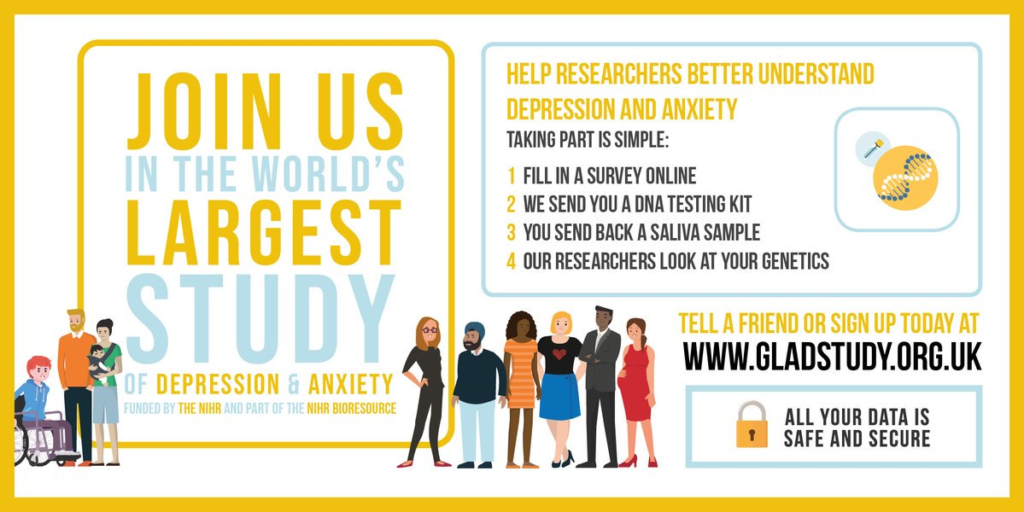
Depression is a common and debilitating mental health condition. Although the average age of onset is early- to mid-twenties, there is quite a wide range, and some research suggests that early onset depression is associated with specific characteristics. For example, early onset depression may have a higher likelihood of showing a more chronic course (continuously experiencing symptoms), greater symptom severity, and may also be influenced by different risk factors. The focus of this paper was to explore the extent to which genetic influences might be useful in understanding differences in risk for early and later onset of depression in adolescence (Rice et al, 2018).
A polygenic score captures the degree of known genetic variants an individual has that have been associated with a particular disorder. Individuals with depression will usually have a higher polygenic score for depression than those without it. However, a previous study indicated that earlier onset depression has a stronger association with a polygenic score for schizophrenia than later onset depression does. The authors of the current paper therefore wished to investigate whether polygenic scores influence depression trajectories. They also investigated polygenic scores for Attention Deficit Hyperactivity Disorder (ADHD), a neurodevelopmental disorder that has high comorbidity and a genetic correlation with depression.

Understanding what influences the age of onset and trajectory of depression could inform prevention and treatment.
Methods
Individuals from the Avon Longitudinal Study of Parents and Children (ALSPAC) completed depression symptom questionnaires up to six times between the ages of 10.5 years and 18.5 years. A statistical analysis was performed to find groups or ‘classes’ of symptom trajectories. Next, associations were explored between these groups and the polygenic scores for depression, ADHD and schizophrenia, as well as diagnoses of neurodevelopmental difficulties (ADHD, social communication problems, pragmatic language difficulties).
Results
There were three classes of trajectories, the number in the brackets indicates the proportion of individuals who fell into the class:
- Persistently low (73.7%) – low risk of depression
- Early-adolescence-onset (9.0%) – first elevated risk of clinically significant depression at age 12 years
- Later-adolescence-onset (17.3%) – first elevated risk of clinically significant depression at age 16.5 years.
Early-adolescent onset depression was strongly associated with polygenic scores for schizophrenia and ADHD, and less strongly with polygenic scores for depression. This trajectory class was significantly associated with diagnoses of childhood ADHD, social communication and pragmatic language difficulties, and individuals displayed higher rates of these difficulties compared to those in the other classes.
In contrast, later-adolescent onset depression was strongly associated with polygenic scores for depression only, not with genetic scores for schizophrenia or ADHD. There were significant associations between this trajectory and pragmatic language difficulties, but not ADHD or social communication diagnoses.
Overall, these results suggest that individuals with neurodevelopmental difficulties may be at an increased risk of depression due to genetic overlap, or the difficulties they face in their environment as a result of their difficulties e.g. peer rejection.

Three groups of depression symptoms trajectories were identified. One where no clinically significant symptoms were experienced, one where they began early in adolescence and one where they began later in adolescence. These were differently associated with genetic scores for depression, schizophrenia and ADHD.
Conclusions
Depression which begins later in adolescence is most strongly associated with genetic risk of depression, whereas earlier adolescent onset is associated with a broader range of genetic risks – schizophrenia, ADHD and depression.

Depression which begins earlier in adolescence appears to be different to later onset depression, thus it may require different treatments or interventions.
Strengths and limitations
This paper presents an interesting combination of using polygenic scores in the context of longitudinal developmental data. It would be useful to also explore the degree of social adversity experienced by these groups and take this into account in the analyses, given evidence that individuals with depression first diagnosed before the age of 11 years have far higher levels of social adversity and risk compared to later onset (Jaffee et al., 2002). One other aspect to note is that as the data were collected over several years there is a risk of non-random drop-out in participants, especially of those with more severe mental health problems.
Implications for practice
Polygenic scores could be combined with neurodevelopmental assessments to determine the likelihood and trajectory of depression. These subtypes of depression, based on trajectory, may respond to treatment differently.

The use of polygenic scores to help us understand mental health problems is an exciting development in research, but it is still early days. We need large samples of individuals who are willing to answer questions about their mental health and provide genetic data.
The GLAD Study
Research like this is really important to help us understand what causes depression and how to best prevent or treat it. This is only possible with the wonderful people who participate in research! The Genetic Links to Anxiety and Depression (GLAD) study is a large new project in England looking for 40,000 people who have experienced clinical depression or anxiety at any point during their life. They will form a database of participants for research studies that investigate how to help decrease the number of people experiencing depression or anxiety. To take part you just need to sign-up online, provide consent, fill in a questionnaire and provide a saliva sample (which is analysed to get your DNA) through the post. Recruitment is already underway and over 20,000 people have consented to take part in the study, but more are needed to ensure that this is a large, representative sample for research that can really make a difference.

The GLAD study is recruiting now! Find out more at gladstudy.org.uk
Conflicts of interest
None
Links
Primary paper
Rice F, Riglin L, Thapar AK, Heron J, Anney R, O’Donovan MC, Thapar A. (2018) Characterizing Developmental Trajectories and the Role of Neuropsychiatric Genetic Risk Variants in Early-Onset Depression. JAMA psychiatry. doi:10.1001/jamapsychiatry.2018.3338
Other references
Jaffee SR, Moffitt TE, Caspi A, Fombonne E, Poulton R, Martin J. (2002) Differences in early childhood risk factors for juvenile-onset and adult-onset depression. Archives of General Psychiatry, 59(3), 215-222 https://www.ncbi.nlm.nih.gov/pubmed/11879158
Photo credits
- Photo by Duri from Mocup on Unsplash
